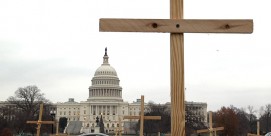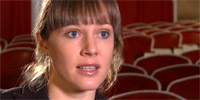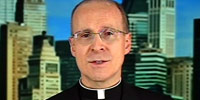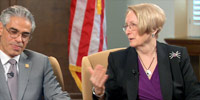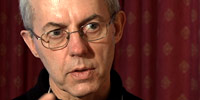Jeffrey Haynes: An Uncontroversial Yet Welcome Speech by An Internationalist Pope
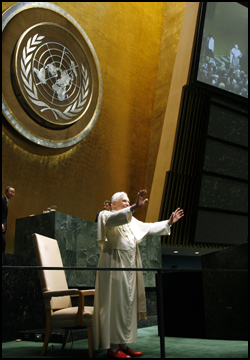 UN Photo/Mark Garten |
Pope Benedict spoke from the perspective of a committed internationalist. This was evident from the very fact that he accepted the invitation to speak at the UN. He emphasized several themes: human rights, inter-religious dialogue, peace and development, security, science and technology. and environmental protection. His main theme was that of human rights, unsurprising given that it is the 60th anniversary of the UN Universal Declaration of Human Rights. For him, a key merit of the Universal Declaration of 1948 was its concern to express a fundamental nucleus of values, and hence of rights, applicable to all cultures and religions.
A second key theme was inter-religious dialogue. He reminded his audience that in his recent encyclical, Spe Salvi [“Saved by Hope”], he stated that “every generation has the task of engaging anew in the arduous search for the right way to order human affairs.” This was a clear indication of the imperative for those of different religious faiths to talk to each other in pursuit of cooperative goals. Third, he spoke of the importance of UN efforts to help achieve global peace and development. He noted that his predecessor, Pope John Paul II, highlighted this theme in 1995 at the UN. Benedict agreed that the UN should be “a moral centre where all the nations of the world feel at home and develop a shared awareness of being, as it were, a ‘family of nations.'” Benedict’s speech was very much in the same vein as that of his predecessor, stressing that the UN must work hard to build a global community, with shared values. Fourth, Benedict highlighted several burning contemporary security issues and problems: the problem of how to achieve development goals globally, how to reduce local and global inequalities, better protection of the environment, of resources and of the climate. He noted that beneficial action in these often linked areas would “require all international leaders to act jointly and to show a readiness to work in good faith, respecting the law, and promoting solidarity with the weakest regions of the planet.” He did not mention terrorism, except in passing, implying that terrorism arises out of stark and continuing developmental imbalances. He also spoke about the negative effects of globalization, especially experienced in Africa and other desperately poor parts of the world; scientific research and technological advances that. while they can bring enormous developments, can also lead, he claimed, to clear violations of “the order of creation, to the point where not only is the sacred character of life contradicted, but the human person and the family are robbed of their natural identity.” He also mentioned the necessity of swift, coordinated, and effective international action to preserve the environment. Overall, this was an uncontroversial — yet no less welcome for that — speech. It highlighted both Benedict and the Church’s internationalist credentials and went some way to gainsaying the idea that he is a dyed-in-the-wool conservative.
— Jeffrey Haynes is professor of politics at London Metropolitan University and the author of “An Introduction to International Relations and Religion” (Longman, 2007).

